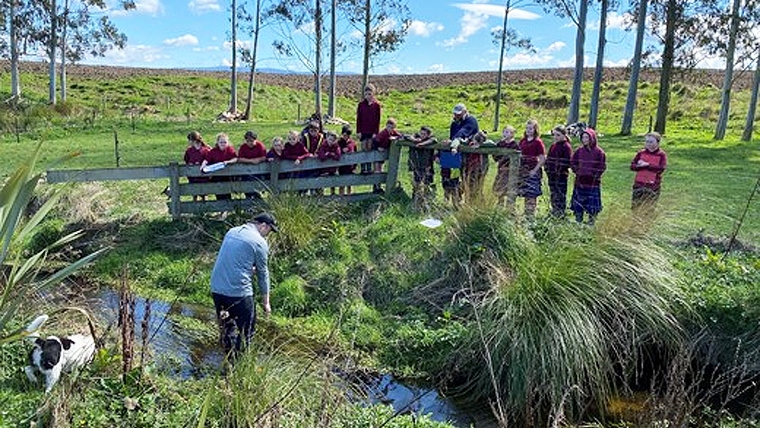
This week marked the continuation of our explorations into catchment groups, and I had the opportunity to connect with Craig Simpson from Otago South River Care.
The mission of Otago South River Care revolves around involving their communities in safeguarding and enriching water quality, both for the present and future generations. The advantages of elevated water quality encompass the protection of ecological habitats and biodiversity, the improvement of recreational possibilities, and the preservation of mahinga kai and cultural values associated with our waterways, both now and in the future.
Otago South River Care is currently spearheading a project funded by the Sustainable Food and Fibre Future Fund, administered by the Ministry of Primary Industries (MPI), with additional support from South Otago Farmers. This initiative is strategically crafted to engage communities in South Otago, fostering advancements in ecosystem health, freshwater quality, and the overall value of food and fibre products originating from the region. The funding for this project kicked off in July 2021 and is slated to conclude in July 2024.
Building upon the foundation laid by the previous Clutha Water Quality Project, which played a pivotal role in establishing farmer-led catchment groups across the Clutha District and implementing a water quality monitoring program, this ongoing project aims to address the evolving challenges faced by farmers. As they grapple with escalating costs associated with environmental regulations, societal expectations, and consumer preferences, it becomes imperative for farmers to maximize the value derived from their food and fibre products. While some farmers opt for a direct-to-consumer trading approach to garner added value for their products, most still adhere to a business model where they supply processors, relying on them to access and convey added value through marketing specific credence attributes to consumers.
In response to these challenges, Otago South River Care conducted research, posing the question: Are consumers willing to pay for on-farm environmental actions such as fencing and planting of riparian areas, and if so, how can farmers tap into these premiums? The report, compiled after a literature review and complemented by semi-structured interviews with processors and industry experts, distils, insights into themes for analysis, contributing to a comprehensive discussion and findings.
There were three key findings, or themes that impacted on farmers access to premiums for environmental action on farm. These are:
- A ‘ticket to the game’ or farmers putting themselves in the best position to capitalise on premium opportunities,
- A ‘right to play’ which was making sure that products met minimum consumer expectations - whether there was a financial incentive to do this or not, and lastly,
- Disincentives can be used to discourage management actions if they are not desirable for customers or consumers.
Key concepts that underpin accessing premiums include product assurance, communication between suppliers and consumers, relationships with processors and demonstrating continuous improvement of farming practices to encourage trust in brands and credence attribute claims.
For farmers to maximise their returns and capitalise on environmental and sustainability premiums, it is recommended they:
- Engage with their processors to understand consumer trends, find opportunities for added value and to access advice on sustainability requirements,
- Participate in farm assurance schemes and work towards extended or premium
programmes with your processor, - Future proof their business by being initiative-taking in adopting environmental management practices and aim for continuous improvement in systems,
- Share their stories from behind the farm gate,
- Embrace technology for data sharing to reduce reporting and verification burdens,
- Investigate a collective approach to productising attributes of local produce to
generate a premium.
And that processors will be able to facilitate increased premiums for farmers by:
- Communicating with their suppliers to understand the attributes that are marketable so farmers can plan accordingly and amend practices,
- Being transparent about added value, including where those premiums are coming from and how they are being shared with suppliers,
- Rewarding or incentivising environmental or sustainability action on-farm,
- Connecting animal welfare and food safety attributes to environmental sustainability which may generate a premium from those attributes,
- Articulating New Zealand’s environmental credence attributes to promote added value, and
- Investigating how to ease reporting burden for farmers.
Otago South River Care also have a strong relationship with schools, the involvement of schools with catchment groups is a great idea, after all children will be the ones inheriting the work being done now so why not get them involved early and be a part of shaping the future. There is a significant change in the way not only farmers are engaging with the land but also the wider community, it’s happening as we speak up and down the country. And yes, a tick for improving water quality programs and increased biodiversity, but this also must be reflected in increased farmgate returns, so this is the challenge for industry and our processors marketing our products internationally. We can feed 40 odd million people, so if we are striving to be world leaders in sustainability then the 40 million people we feed need to be the conscious consumer and who have the ability to pay for the privilege of what we grow in this country, we should not be competing with the likes of Brazil or other nations who don’t come close to the products we produce here.
Listen to the podcast above to hear the interview with Craig Simpson, and you can head along to the Otago South River Care website to read their report.
Angus Kebbell is the Producer at Tailwind Media. You can contact him here.

We welcome your comments below. If you are not already registered, please register to comment
Remember we welcome robust, respectful and insightful debate. We don't welcome abusive or defamatory comments and will de-register those repeatedly making such comments. Our current comment policy is here.